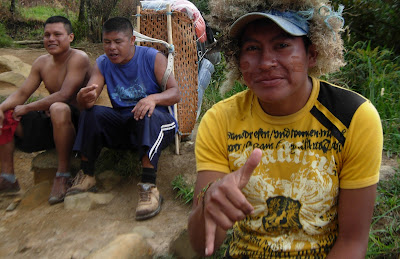Speak like a native - Pemon and Warao basics (original) (raw)
A group of young Pemon porters take a rest on the way down from Mount Roraima.
For many travellers to Venezuela the biggest worry language-wise is getting a grasp on enough Spanish phrases to book hotels and buses, order drinks and make friends. But what do you do in the areas of Venezuela where Spanish is not the natural first language of the people who live there?
If you're heading for Canaima to see Angel Falls, the highest waterfall in the world, or climbing the Lost World tepui of Roraima your guides and boatmen will be from the local indigenous people, the Pemon.
If you visit the Orinoco Delta you'll be fishing for piranhas with men from the Warao tribe or buying baskets and handicrafts from Warao women.
These distinct indigenous cultures deserve our respect. They are after all the original inhabitants of the continent, surviving in these lands for thousands of years before the arrival of Columbus and preserving their language and culture today against all the odds.
From my experience, there is no better way to raise a smile and show respect for Pemon and Warao culture than to learn a few words of the local language. A simple "hello" might not seem like much but you'll soon discover how eager the indigenous people you meet will be to teach you new words and phrases and show you off to their friends and family.
To help visitors learn a few basic words I've created a short glossary to try out on your travels. You won't find anything like this anywhere else on the internet so print it out and take it with you.
Pemon Language Basics
Greeting
Hello, how are you? - waküperö
Good - wakü
Bad - awarö
Taking leave
Goodbye - airö
Expressions
Thanks - waküpe-küruman
I like - waküpeman
Friend -upetoy
House - tapüy (as in flat-topped mountain, also spelled tepuy, tepui)
Numbers
1. Taükin
2. Saküne
3. Seurawöne
4. Sakorörö
5. Taükin - yenna
6. Pona taükin
7. Pona saküne
8. Pona seurawöne
9. Pona sakorörö
10. Saküne yenna
Warao Language Basics
Greeting
How are you? How's things - Katuketi?
Possible replies
Good - Yakera
Very good - Yakera guito
Ok - Yakera sabuka
Bad - Asida
Taking leave
Goodbye - Omi
Numbers
1. Isaka
2. Manamo
3. Dijanamo
4. Orabakaya
5. Mojabasi
6. Mojomatana isaka
7. Mojomatana manamo
8. Mojomatana dijamo
9. Mojomatana orabakaya
10. Mojoreko
20. warao isaka (a Warao has ten fingers and ten toes so one Warao = 20)
Warao women sell moriche fibre baskets and wood carvings of local animals from a palafito (house on stilts) in the Orinoco Delta.

